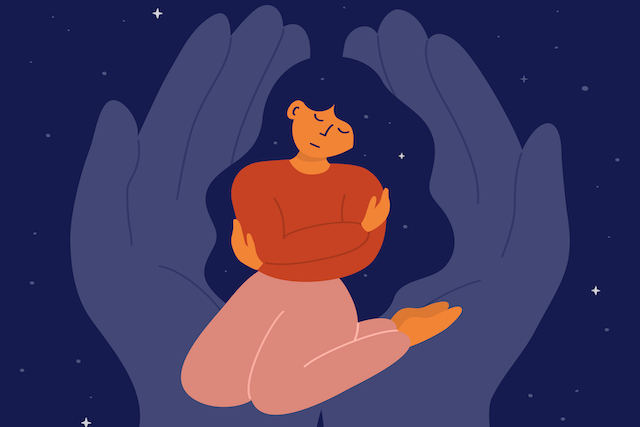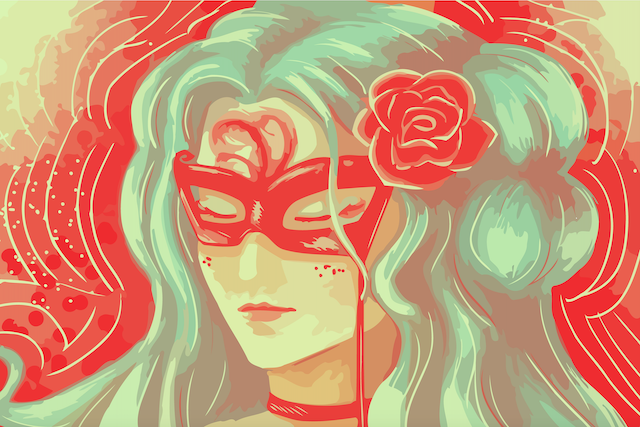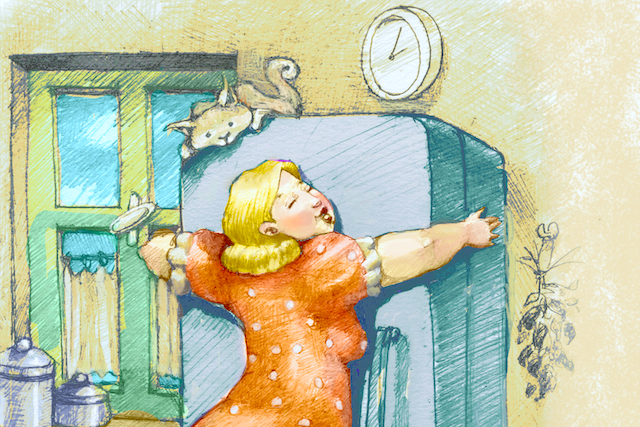
“I am doing the best I can, and I am enough.” ~Unknown
I don’t know about you, but I’ve recognized that historically, I’ve treated myself more harshly than anyone else ever has—and I’ve been in my share of abusive relationships.
I’ve held myself to ridiculous standards, pushed myself to be and do more than I reasonably can, and beat myself up over minor mistakes, as if I didn’t deserve my own respect or compassion. As a result of this emotional abuse, I’ve ended up abusing myself physically, through bulimia, binge drinking, and smoking—all attempts to numb the pain of both my past and my punishing inner voice.
I know I’m not alone with this. And I also know that it’s not our fault that we’ve been conditioned to treat ourselves so cruelly, but it is our responsibility to recognize the wounds that shaped us and do the work to heal.
The first step is understanding why and when we judge ourselves, and from there taking steps to change how we talk to ourselves—which will ultimately change how we treat ourselves. So why do we judge ourselves?
8 Reasons We Judge Ourselves
1. We have an idea in our heads of who and where we think we should be, and we blame ourselves if our reality isn’t measuring up—as if we are solely responsible for everything we experience in life.
In a world with rigid definitions of success and constant exposure to everyone else’s accomplishments, it’s easy to believe you’re failing and falling behind—and it’s all your fault.
Especially if you live in an individualistic culture, like the US, you might believe you need to be special, self-made, to pull yourself up by the bootstraps and succeed on a massive scale—with an endless feed of #nofilter selfies to prove you’re living the good life.
The alternative is to recognize that we alone are not responsible for our “success.” There are lots of factors beyond our control, and we all have different advantages and disadvantages.
Also, no one who’s traditionally successful has gotten there on their own. Many “successful” people have hundreds of fingerprints all over their bootstraps—you just don’t hear about them during interviews that focus primarily on all the things that one person did to get them where they are today.
Next time you’re tempted to compare your life to this ideal that looks good on paper—that might not even make you happy, if it’s not aligned with your personal values and priorities—remind yourself that you can only control your efforts; the outcome is out of your hands, and not a reflection on you personally.
And your happiness isn’t dependent on achievement, otherwise there wouldn’t be so many rich and powerful people struggling with depression and addiction. Your happiness is dependent on how you experience this day—the activities you choose, the time you spend with people you love, and how kind you are to yourself in your head.
So instead of beating yourself up for not “living your best life,” take the shortcut to happiness instead and make the best of the life you’re living right now.
2. We evaluate our worth based on our performance and mistakes, as if we are what we do.
Building on the previous point, we think we have to prove our value through achievements and worry that our worst moments define us.
This is a habit I know all too well. I grew up hungry for the approval I got when I succeeded and desperate to avoid the disappointment that accompanied falling short.
I learned that if I failed or made a mistake, it wasn’t because I did something wrong, it was because I was wrong. I didn’t feel guilty about what I’d done or failed to do, I felt ashamed of myself for being the kind of person who continually messed everything up.
Ironically, I then learned to punish myself whenever I felt ashamed, which then led to more shame-triggering behaviors—like binge drinking to numb my pain, then feeling bad about how I acted when blackout drunk, then binge eating to numb that shame.
It creates a vicious cycle that we can only break when we learn to disconnect our actions and efforts from our identity and recognize that “good” people sometimes make “bad” choices or have “bad” moments—and deserve love and empathy, nonetheless.
It’s a practice, not a one-time shift in thinking, and it becomes easier when we work on the following…
3. We struggle with accepting ourselves as we are because we’re operating based on the false belief that we’re not good enough.
Maybe you developed this belief because it seemed nothing you did growing up was right—either because your parents were hard to please, or they constantly compared you to a high-achieving sibling.
Or maybe someone directly told you you’re not good enough. Emotional abuse has become somewhat normalized, because it’s a pattern people repeat based on what they experienced growing up. And because it doesn’t leave any visible scars, it’s easy to justify cruelty as necessary to maintain control and encourage “good” behavior.
Recognize that this belief is not a fact. And it has nothing to do with who you are. A Tiny Buddha contributor named Marie once wrote about the epiphany she had when she realized if her mother had had a different child, she would have treated her exactly the same way. So it wasn’t that Marie wasn’t good enough; it was that her mother was simply unable to love her in the way she deserved.
If you can start trying this new belief on for size, you can start changing the monologue in your head from the cruel voice of someone who treated you poorly to the loving voice you deserved to hear—one empathetic response at a time.
4. We think we need to be perfect to be lovable, and any sign of imperfection triggers the fear of losing love.
Traditional parenting promotes the idea of withholding affection when children “misbehave” (which is often just a misguided attempt to process their feelings and meet their needs).
On the extreme this might mean physical punishment, but even more palatable disciplinary approaches, like “time outs,” can feel like a loss of love—as if our parent is telling us we don’t deserve attention or affection when our behavior disappoints them.
And it’s not just the parent-child relationship that teaches us only acceptable behaviors will earn us love. Maybe you learned the same in a relationship with an emotionally abusive person, where you were stonewalled when you said or did the “wrong” thing.
There’s no sugarcoating it: Some people will reject us if we don’t meet their expectations, just as we may have experienced in the past. So, the goal isn’t to reverse the belief that we might lose love if we’re imperfect. It’s to practice loving ourselves even when other people don’t, or don’t act like it.
This isn’t easy if we’re constantly jutting up against the belief we deserve to be abused (because that’s how our younger brains made sense of the pain we endured).
I remember a line from a movie that really stuck with me: the daughter of a father who abandoned her said something along the lines of, “The crazy thing is you don’t grow up asking yourself, ‘What’s wrong with him?’ You ask yourself, ‘What’s wrong with me?’”
Isn’t that what most of us do? Look at how people treated us and question what we did to deserve it? As a consequence, self-loathing and/or self-flagellation become a deeply engrained habit, which brings me to my next point…
5. We think self-judgment and self-flagellation are effective ways to motivate ourselves to be better.
We’ve conditioned ourselves to believe we need to beat ourselves up to do better—perhaps because we’re repeating the pattern we lived when we were younger (failure -> punishment -> the expectation of improvement).
This reminds me of a quote that’s guided my parenting philosophy:
“Where did we ever get the crazy idea that in order to make children do better, first we have to make them feel worse? Think of the last time you felt humiliated or treated unfairly. Did you feel like cooperating or doing better?” ~Jane Nelson
The answer, for me at least, is no! I never feel like doing better when I feel deeply ashamed. But that’s how I feel when I put myself down. I’m guessing the same is true for you.
Even if we manage to encourage some positive changes from self-judgment and self-flagellation, we likely won’t feel good about them because we’ll evaluate those changes with the same inner cruelty—thinking our progress isn’t good enough or isn’t happening fast enough.
The alternative is to motivate ourselves as we’d motivate someone we would never want to hurt. I find it helps to visualize the five-year-old version of myself. That innocent little girl who tried her best and always feared it wasn’t good enough.
I visualize myself holding her, looking into her tear-filled eyes, and telling her it’s all okay. It’s okay that she messed up. It’s okay if she’s not perfect. It’s okay to be exactly who and where she is, because I will love her anyways. And that love will help her grow.
6. We’ve adopted beliefs about what’s good and bad and right and wrong—e.g.: good people don’t get angry, it’s wrong to put yourself first—and we judge ourselves when we act out of alignment with these beliefs.
We all carry beliefs about what’s good and right, stemming from our past conditioning, and because we want to be good people (to be worthy, to be loved, to belong), we experience immense internal discomfort when we think we’re doing something “wrong.”
We end up stuffing down our feelings and ignoring our needs—all while judging ourselves for everything we’re trying desperately to repress.
Those feelings and needs don’t go away. As Tiny Buddha contributor Marlena Tillhon wrote, when we’ve shame-bound and repressed a feeling, like anger, it shows up in other ways. So, we may feel intense anxiety instead of communicating our frustration with someone, or we may feel depressed instead of setting boundaries with people who treat us disrespectfully.
And as for our needs, if we don’t meet them, we end up feeling resentful of other people and situations instead of owning the fears that cause us to neglect ourselves and our responsibility for overcoming them.
So now we’re judging ourselves while navigating an emotional landmine, all in an attempt to avoid feeling bad or wrong.
The alternative is to recognize the beliefs that are guiding us, acknowledge that they aren’t facts, and push through the discomfort of owning our feelings and needs.
It’s not an easy task, I know—I often feel guilty for experiencing anxiety because, at a young age, I adopted the belief that anxiety is a sign of weakness, which brings me to my next point…
7. We’ve bought into societal stigmas—that mental health issues aren’t real, or addicts are weak—and beat ourselves up for our struggles.
We live in a judgmental world, so it’s only natural that we’d buy into these stigmas and judge ourselves harshly as a result.
Questioning these stigmas can feel like swimming against a current; we need to allow ourselves to believe that the majority (or what feels like the majority) are wrong. And we need to learn to give less weight to what other people think, in general and about us.
For a long time, when I was struggling with bulimia, I exacerbated my self-loathing by telling myself bulimics were gross—something I’d internalized from external messages I’d received. I believed binging was a sign that I lacked self-control, and purging was a sign of my inherent repulsiveness.
I remember on my first day of art therapy, in a long-term residential treatment program, I drew myself curled up in a bag of vomit. Because that’s how I saw myself: disgusting… discardable… trash.
It was impossible to heal with these beliefs driving my self-perception. Until I empathized with myself, I would continue hurting myself in one way or another because I would continue believing that I deserved to be hurt.
It was a huge epiphany for me when I realized some part of me actually wanted to hurt, which brings me to my final point…
8. We’ve become addicted to feeling bad about ourselves and have essentially trained our brains, through repetition, to think negatively about ourselves.
Usually with addictions, our reward system is activated when we experience a dopamine rush, which is why we keep repeating the behavior. Feeling bad in no way feels good, but it may feel familiar, and it may be our default mode because we’ve reinforced it through repetition.
If you always tell yourself you’re a failure, then you feel nervous when doing something hard—then create a self-fulfilling prophecy by letting your insecurities hold you back—you’re basically caught up in a cycle of beliefs influencing behavior which then reinforces beliefs.
I have been here many times before, most notably as it pertains to social situations. I was bullied as a kid and, in response, an authority figure told me, “If I was your age, I wouldn’t be your friend.” So, I learned to believe that no one would like me, and this created a social awkwardness that made it hard to connect with people.
Because I thought people wouldn’t like me, I made it hard to get to know me, and no one had a chance to like me. But this felt safe. Because if they didn’t know me, they couldn’t hurt me. Unfortunately, though, I could still hurt myself—and would continue to hurt myself until I decided I didn’t have to live the story that I was unlovable. And I didn’t have to reinforce by treating myself that way.
—
Overcoming self-judgment is hard work, and it’s not something we do overnight. It may take years to recognize and change our beliefs and patterns, and it might be a process of two steps forward, one step back—or maybe one step forward, five steps back.
The beautiful thing about the difficulty inherent in this process is that it provides countless opportunities for us to practice loving ourselves—or at least being kind to ourselves—through struggle.
So, celebrate your victories, no matter how small, and see the opportunity in your missteps, no matter how big. It’s all the path to healing, which can be incredibly dark and scary, despite leading to light, so we deserve a lot of credit for being brave enough to take it.
—
This is the last post in a five-part series on letting go, echoing the themes in my guided meditation/EFT tapping package ($99 value)—now available as a FREE bonus with Tiny Buddha’s Mindfulness Kit (which is now on sale for $39). You can find the first post introducing the series here, the second post on letting go of approval here, the third post on letting go of the need to control people and life here, and the last post on letting go of stress and pressure here.
The Mindfulness Kit includes four aromatherapy-based products, a daily meditation practice guide, and three digital guides for daily calm.
Ready to find peace from your busy mind? Get the Mindfulness Kit and get instant access to the meditations and digital bonuses here.
![]()
About Lori Deschene
Lori Deschene is the founder of Tiny Buddha. She’s also the author of Tiny Buddha’s Gratitude Journal and other books and co-founder of Recreate Your Life Story, an online course that helps you let go of the past and live a life you love. She recently launched a Mindfulness Kit to help reduce our stress and increase our peace and joy. For daily wisdom, join the Tiny Buddha list here. You can also follow Tiny Buddha on Facebook, Twitter, and Instagram.
Get in the conversation! Click here to leave a comment on the site.
The post 8 Reasons We Judge Ourselves and How to Let Go of the Habit appeared first on Tiny Buddha.
from Tiny Buddha https://ift.tt/2YqxfRS









































